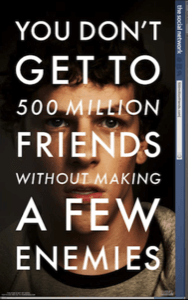Startups and Hollywood are more alike than we give credit. After nearly 12 months at a Y-Combinator company in Silicon Valley, I find myself noticing an eerie resemblance between my previous life in the film industry in NY/LA.

This week’s release of The Social Network, an interpretation of the rise of Facebook, and it’s founder Mark Zuckerberg, is another corridor between these two worlds. It’d be easy to brush this film off as an opportunistic attraction produced by Hollywood’s gluttony, if it weren’t for the people behind the project. The team who made The Social Network, like the talent behind the real Facebook, are among the brightest individuals in the industry.
Guest author Robert Hrdinsky is creative entrepreneur and part of the team at Cloudkick, a Y-Combinator funded company based in San Francisco. Previously he worked in the offices of Scott Rudin in New York and Summit Entertainment in Los Angeles.
The film is based on the nonfiction book The Accidental Billionaires, written by Ben Mezrich, author of Bringing Down the House, which was itself adapted for the screen as 21, starring Kevin Spacey. Spacey is back as executive producer, and is joined by a star-studded executive team, including prolific deal-maker Michael De Luca, Aaron Sorkin, David Fincher, and major power player, producer Scott Rudin.
Here’s what that team of Hollywood kingmakers can teach startups.
Success
In startup culture, there’s a philosophy of building a minimum viable product – a product designed to do one specific task before even worrying if it’ll ever grow into proper business. No greater example than Twitter, whose sole existence lies in 140 characters.
The Hollywood version of that is to make a short film. A short offers you the ability to see if the character is meaningful. Films from Office Space to Boogie Nights all had their beginnings as shorts. A $500 short film, Peluca, became a proof of concept that secured a $400,000 budget to make a feature-length film, Napoleon Dynamite. At Sundance it became the talk of the town and quickly sold its distribution rights for $4.5 million, and it went on to earn over $45 million at the box office.

Failure
You will fail. Like baseball, your swing will fail you seven times out of 10. And if you’re really good, just maybe, your one success will even be meaningful enough to talk about the next day. Despite spectacular teams and VIP funding, companies still crumble – e.g. joost. Hollywood wrote the book on failure – high-stakes, 100-million-dollar failure. To cross the profit line in any significant manner takes an army of individuals spanning continents.
Mashups
Heat meets The Departed, proclaims an advertisement for the recent Ben Affleck film, The Town. These silly and contagious analogies are also prevalent through out Silicon Valley. Twitter meets Mint.com creates Blippy. These classic pitches are echoed in elevators worldwide. You can even form them to present an idea: Jaws in space is the premise for Aliens. Blogging in email reveals Posterous.
We Blend
Silicon Valley and Hollywood are creatures of the same exotic ether, and the future of our collaboration has been already been revealed: Netflix. The transition between these two worlds has already been exercised by prominent figures. Social media extraordinaire and Hollywood favorite Ashton Kutcher, is now an angel investor. Jeff Skoll, number one at eBay, ventured into Hollywood to begin a noble production house, Participant Media, which has already garnered over a dozen Oscar nominations.
Only the Few Matter
Power players count. There are hundreds of angel investors and VC firms rooted in Silicon Valley, but there are only a handful that matter. Talent agencies and production houses are a dime-a-dozen, but you only care to be associated with a rare few.
This week the public will be exposed to a voyeuristic view of Silicon Valley, a portrayal of a culture that’s no different than one behind the camera. Will The Social Network become a timeless masterpiece? Will Facebook acquire half a billion users? These are unpredictable, highly volatile processes – and therein lies the beauty of the art we’re dealing with. Because what are films and startups but ideas built upon a dream.
Clapper photo by jaylopez. Social Network poster via Sony Pictures Digital





















